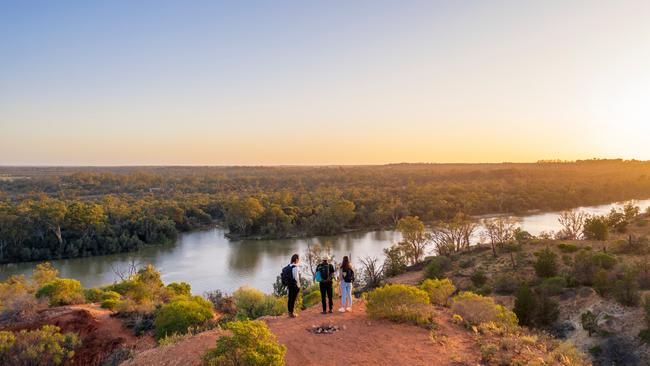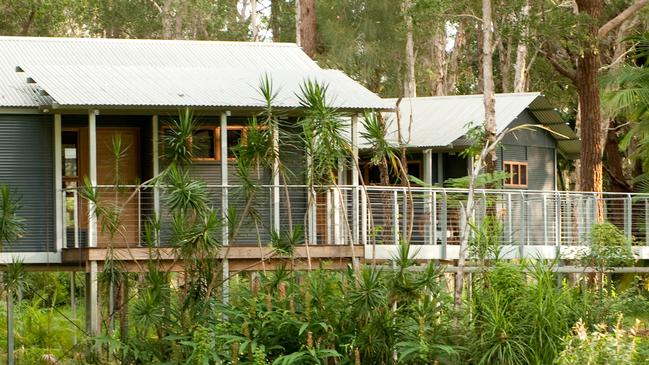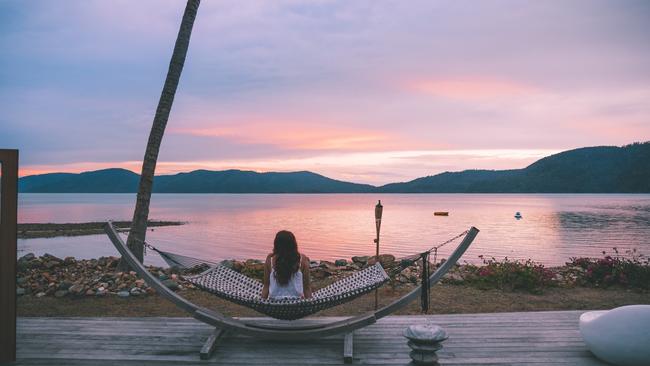How to choose a true ecotourism experience
Ecotourism is big business. But how do claims of sustainability in the tourism landscape actually stand up under scrutiny?

In early November, Murray River Trails was crowned winner in the Ecotourism category at the 2021 South Australian Tourism Awards, as it has been every year since environmental scientist Tony Sharley started the business in 2016. The four-day walk meanders upstream beside the Murray from the town of Renmark, but follows no formed tracks. Instead, guides pick their way along animal foot pads or faint paths tracing the river’s edge, with each trip’s course as ephemeral as the river’s flow. Accommodation is on a houseboat that follows guests along the river. When they leave, there is no sign they were ever there.

What is ecotourism? The environmental footprint is only one aspect of it. There needs to be a reason for people to visit a destination – a social, cultural or historical theme – and that reason needs to be communicated clearly, so they can take something away, and hopefully even give something back.
On the Murray River Walk, the theme is river stewardship, and guests learn the “life cycle” of Australia’s most famous river. Sharley says that after seeing the benefits to the natural environment of periodic high flows that break the banks and spill on to the floodplains, revitalising the river red gums and stimulating breeding for birds and fish, guests leave with a desire to take up advocacy for the waterway. “People develop [a sense of] ownership. If you don’t understand something you can’t care for it. That’s what ecotourism is.”
Of course, there’s a difference between a landscape getting a wash of green and a tour operator indulging in a bit of “greenwashing”. You could be forgiven for thinking there’s a government mandate on tacking the prefix “eco” to every cabin, retreat or resort. But step inside your room, you may find plastic water bottles, electricity sourced from a coal-fired grid, and more evidence that “eco” is more a pretence than a reality.
By that stage it’s too late; you’re already there. So how to sort the sustainability chieftains from the charlatans?

Ecotourism is big business. Booking.com’s 2021 Sustainable Travel Report reveals 83 per cent of travellers (from a global survey of 29,000 people) think sustainable travel is “vital” but only half think there are enough sustainable options available.
More than 70 per cent of survey respondents say they want “authentic experiences that are representative of the local culture”, while 84 per cent believe “increasing cultural understanding and preservation of cultural heritage is crucial”. So it’s no surprise some operators might try to talk up what could be dubious environmental and sustainable credentials to capitalise on that demand.
“Greenwashing is rife across tourism as corporate spin-doctors seek PR shortcuts to smooth over community demands for action,” says Lindsay Soutar, senior campaigner at Greenpeace Australia. She wants to see less talk and more “credible action” from the tourism industry to address climate impact, and says major hotel chains should be leading the way in reducing emissions. “Switching to 100 per cent renewable energy is a key test of the credibility of sustainability commitments.”
The problem in part comes down to scope. A business may be eco-friendly in some ways but lagging in others. Ecotourism Australia’s chairman Claire Ellis says she believes greenwashing is increasingly becoming an issue, but is not always malicious. “Holding the right values alone isn’t enough,” she says. “What’s hard for consumers is working out whether one thing an operator does well flows across all elements of the business. Often the operators don’t have the knowledge or expertise to work out how they could do things better.”
Certification schemes can help give that clarity to consumers. Ecotourism Australia certification assesses multiple factors, including energy, waste, water and carbon footprint, taking the guesswork out of making an informed choice.
“It takes operators months to go through our certification system, and technology keeps changing, so what was gold standard 15 years ago is not any more,” says Ellis. EarthCheck is another global benchmark for sustainability accreditation, particularly in the luxury hotel space, while Australian Wildlife Journeys gives credible endorsement to businesses offering sustainable, minimal-impact wildlife encounters. Ecotourism Australia’s Respecting Our Culture certification is awarded to enterprises that showcase local cultural values and heritage, while Climate Action certification recognises those taking significant steps to reduce their carbon emissions.

When wondering what is ecotourism, Ellis advises consumers to look for those that are proactive in telling their sustainability story. “The worst operators I think are the people who don’t tell you what they’re doing. If you’re going to say you’re eco-friendly then you need to be transparent and tell consumers where they can find out more about it.”
Some believe there’s a more cynical aspect to that apparent shyness; that some companies may be doing the opposite of greenwashing. Amanda Lambert from Green Getaways Australia, which collates selections of eco-friendly properties, says details of a hotel’s sustainability policy are sometimes “squirrelled away in the back section of their website”, even when the hotel is achieving high standards. She suspects some hotels that trade on luxury are afraid guests will associate “eco” or “green” with “doing without”. “We think tourism operators could do a lot more to communicate their positive actions to guests who are searching for it,” she says.
Lambert’s theory is somewhat reflected in Booking.com’s report, which showed that while 75 per cent of accommodation providers say they’ve implemented sustainability practices, only one-third actively communicates this to guests. Meanwhile 30 per cent of guests say they don’t know how to find sustainable accommodation options.
Even Sharley, his shelf cluttered with ecotourism awards, knows his company can always do better. Fossil fuels power the houseboat, but transitioning to electric engines is not yet feasible. Instead he’s fitting solar panels to the boat, so the noisy diesel generator can be retired. It’s about constant refinement. “I often ask myself, ‘What’s the difference between nature tourism and ecotourism?’. Essentially, asking what is ecotourism? Nature tourism is about ticking boxes: went to the Rock, went to the reef. Ecotourism has a level of interpretation that shows visitors you understand the ecology of a landscape. If I can’t explain to you what triggers breeding around here, or how this river system was formed, then it’s not eco-tourism. And you can’t greenwash that.”

More to the story
Four examples of Ecotourism Australia’s gold standard accreditation, known as Advanced Ecotourism, which is awarded to businesses that excel environmentally and socially by contributing positively to their local community.
Elysian Retreat Luxury villas on Long Island in the Whitsundays operating on 100 per cent solar power, offsetting 150 per cent of carbon emissions.
True North Adventure Cruises Boutique, small-group expedition cruises around Western Australia’s Kimberley, Indonesia and West Papua; shallow-draft boats are designed to access remote wilderness, requiring no shore-based structures.
Lady Elliot Resort This once degraded island offshore from Bundaberg is now restored to support fragile ecosystems within a coral cay sanctuary on the Great Barrier Reef.
Diamond Waters Treehouse Retreat Two treehouses tread lightly in the forest of the NSW mid-north coast; 100 per cent solar powered with independent water supply and wastewater management system.

Four operators that hold Ecotourism Australia’s Advanced Ecotourism, Respecting our Culture and Climate Action certification.
Mon Repos Turtle Centre Visit Bundaberg November to March to watch the largest gathering of nesting marine turtles in the world, playing your role in the ongoing conservation of the species.
Eco Treasures Tours Sydney-based water guides offer paddleboard, kayak and snorkelling educational tours of the city’s northern beaches, waterways and surrounding national parks.
Under Down Under Tours Tasmanian guided-tour company that matches your carbon offset donation dollar for dollar through the Carbon Neutral Charitable Fund. A stay at the four-star Thousand Lakes Lodge comes with free use of e-bikes.
Daintree River Cruise Centre Founded by conservationists in 1987 to cruise the rainforest-lined Daintree River, 100km north of Cairns; minimal ecological impact while supporting community and conservation projects.
daintreerivercruisecentre.com.au
In the know
Red flags for greenwashing:
No obvious certifications on the website. Look for accreditation logos and check they are endorsed by the Global Sustainable Tourism Council. Ecotourism Australia also has a Green Travel Guide.
No proof of claims. It’s not good enough for a business simply to say it is sustainable or green. Management should be telling you how and why.
Misdirection. An operator may talk up one element of sustainability to draw attention away from its other environmental shortcomings. Don’t be fooled by green-sounding labels.
Lack of knowledge. Guides or hosts should be able to explain the local ecology, as well as the social and cultural fabric, and tell you how their operation fits within that.
Operators who provide plastic (or even bioplastic) straws or cups. That should be an obvious no-no by now.
This story was originally published in November 2021 and has since been updated.

To join the conversation, please log in. Don't have an account? Register
Join the conversation, you are commenting as Logout